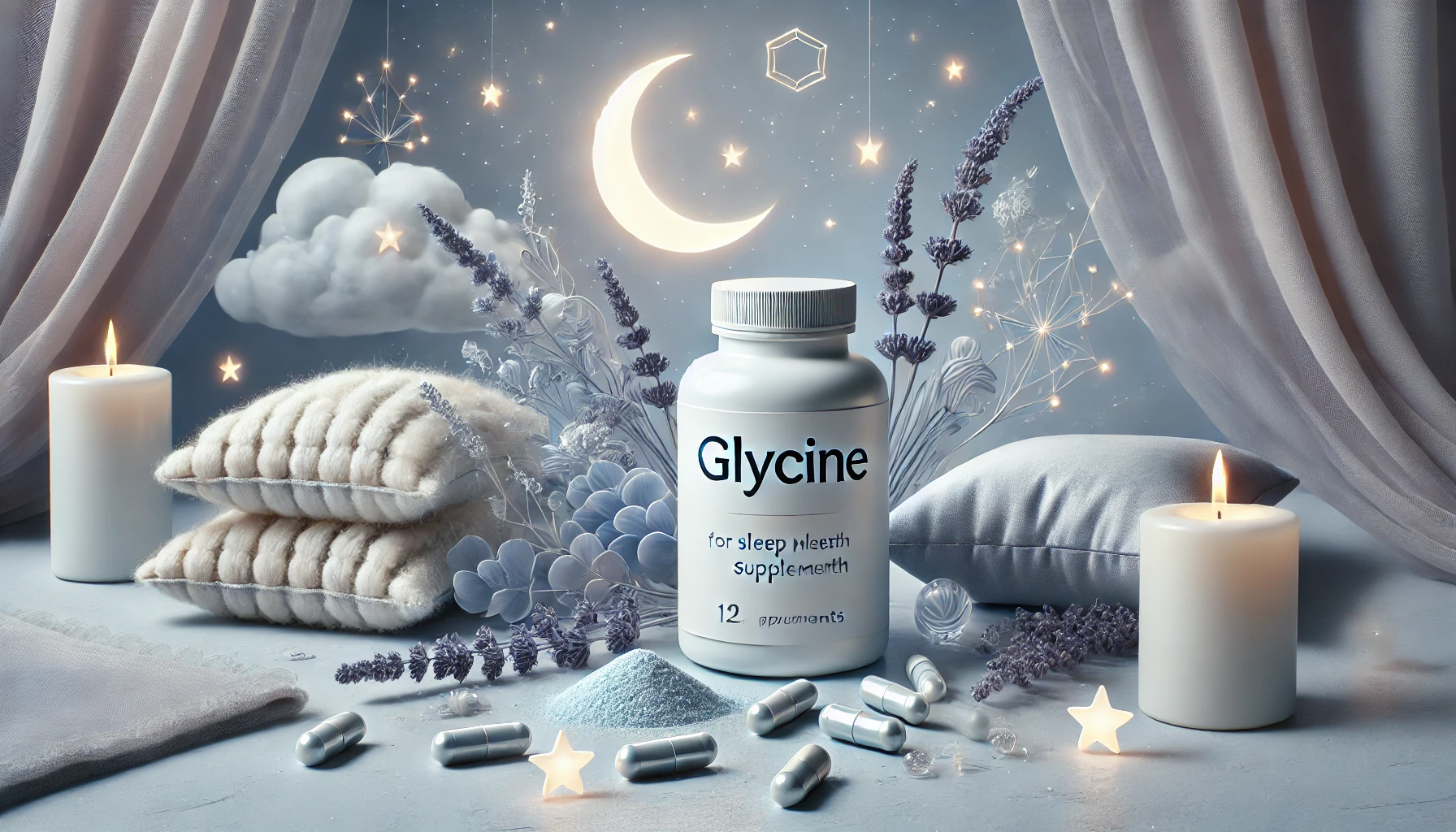The non-essential amino acid glycine has recently drawn increased interest in the nutritional supplement world due to its potential to enhance the quality of sleep. The nature, health advantages, recommended dosage, negative effects, possible drug interactions, and responsible use of glycine as a nutritional supplement for individuals looking to improve their quality of sleep are all covered in this article. The chemistry of glycine and the physiological basis for its impact on the body and brain are covered in depth in this article. It also makes positive mention of Delta Brain Luxury, a product made accessible by Brain Luxury that is one of the best sources of glycine on the market in a synergistic and highly bio-available formulation.
You May Also Like:
Zuma Zeolite Reviews: The Facts About This Superb Tonic
Ignite Your Youth: Unlocking Science-Backed CBD Benefits for Seniors
Glycine: Benefits, Dosage, Side Effects, Drug Interactions, And Other Important Information is an original (MedNewsPedia) article.
Nature of Glycine
Glycine is a non-essential amino acid, which means that the body can produce it on its own and that dietary intake is not necessary. Supplementation, however, can offer extra health advantages. Glycine is the smallest amino acid, and it has a simplistic structure with a hydrogen atom acting as its side chain. It is a hydrophilic, polar molecule that participates in detoxification, neurotransmission, and protein synthesis among other biological activities.

Health Benefits of Glycine
1. Enhanced Sleep Quality: Glycine has been demonstrated to enhance the quality of sleep by encouraging deeper, more restorative sleep. It is believed to function by reducing body temperature, which is important for inducing sleep, and by controlling neurotransmission in the brain. According to studies, glycine supplementation can speed up the onset of sleep, improve the quality of that sleep, and lessen nighttime awakenings.
2. Cognitive Function: Glycine is an inhibitory neurotransmitter that can reduce neuronal activity and encourage relaxation in the central nervous system. Being an essential component of the N-methyl-D-aspartate (NMDA) receptor, a crucial component of synaptic plasticity, it also contributes to the establishment of memory and learning.
3. Anti-inflammatory and Antioxidant Properties: Glycine has many anti-inflammatory and antioxidant properties. It does this by scavenging free radicals and lowering oxidative stress. While it can prevent the creation of pro-inflammatory cytokines and encourage the release of anti-inflammatory cytokines, it also possesses anti-inflammatory characteristics.
4. Collagen Synthesis: Glycine is essential for the synthesis of collagen, the most prevalent protein in the human body. Connective tissues like skin, tendons, and ligaments are made of collagen, which gives them structure and strength. Consuming enough glycine can support the production of collagen and improve tissue health in general.

Chemistry of Glycine
The simplest amino acid is glycine, which has the chemical formula NH2-CH2-COOH and only one hydrogen atom on its side chain. It contains a positive charge on the amino group and a negative charge on the carboxyl group in its zwitterionic form, which can be found at physiological pH. Because of this property, glycine can easily dissolve in water and take part in a number of metabolic processes. Because of its diminutive size and adaptable structure, it can slip into small crevices inside proteins and maintain their shape.
Physiological Properties of Glycine on the Body and Brain
The NMDA receptor, which is essential for synaptic plasticity and memory formation, and glycine’s function as an inhibitory neurotransmitter in the central nervous system make up its physiological properties. The main ways that glycine affects the body and brain are described in the sections below:
1. Inhibitory Neurotransmission: In the central nervous system, glycine functions as an inhibitory neurotransmitter by interacting with glycine receptors and lowering neuronal excitability. This adjustment of neural activity encourages unwinding and may aid in promoting sleep.
Glycine is an essential part of the NMDA receptor, a glutamate receptor involved in learning, memory, and synaptic plasticity.
2. NMDA Receptor Function: Glycine has the capacity to alter cognitive functions and enhance the quality of sleep through modifying the NMDA receptor’s activity.
3. Thermoregulation: By regulating body temperature, glycine can enhance the quality of sleep. Glycine supplementation has been shown to cause a little drop in core body temperature, which is linked to the beginning of sleep.
In conclusion, glycine’s physiological properties involve its functions as an inhibitory neurotransmitter, a part of the NMDA receptor, and a regulator of body temperature. These behaviors can improve sleep and overall brain health.

Optimal Dosage of Glycine
The amount of glycine that works best to improve sleep varies from person to person, but studies shows that 3 grams given around 30 minutes before bed can boost sleep quality. Before beginning glycine supplementation, it is crucial to speak with a healthcare provider to establish the right dosage for your needs.
Side Effects of Glycine
When consumed at authorized dosages, glycine is generally regarded as safe. However, some individuals can develop negative side effects like nausea, dizziness, or gastrointestinal issues. By beginning with a lower dose and gradually increasing intake as tolerated, these side effects, which are typically minor, can be reduced.
Potential Substance Interactions with Glycine
Although glycine has no known severe drug interactions, it is always important to speak with a doctor before using it with other drugs or supplements. This promotes security and guards against any possible negative effects.
Best Responsible Use of Glycine for Sleep Improvement
Choose a high-quality, pure source of glycine if you want to benefit from its sleep-promoting properties. One of the best sources of glycine on the market is found in Delta Brain Luxury, a product made by Brain Luxury that has a synergistic and highly bio-available formulation. Glycine can improve sleep quality from induction through duration when combined with other sleep-enhancing substances in Delta Brain Luxury.
Use these recommendations to guarantee the best responsible usage of glycine:
1. Before beginning a supplement regimen, speak with a health care expert to determine the right dosage for you.
2. To reduce the possibility of side effects, start with a lower dose of glycine and gradually increase intake as tolerated.
3. To ensure the greatest efficacy and security, choose a high-quality, pure source of glycine, such as Delta Brain Luxury.
4. To get the best benefits, keep an eye on the quality of your sleep and modify the dosage as necessary.

Glycine:
Conclusion
Glycine supplementation offers a wealth of health benefits. From supporting gut health to enhancing skin vitality, aiding in detoxification, and even improving sleep quality, glycine plays a crucial role in our overall well-being. It helps regulate plasma glycine levels, which are associated with cardiovascular health, glucose metabolism, and stress response. Additionally, glycine’s anti-inflammatory effects and ability to modulate cell growth contribute to its protective role against chronic diseases. By incorporating this amino acid into your routine, you’re investing in better sleep, healthier skin, stronger bones, and much more.

References:
1. Nootropics: Bhabha, Homi K. The Location of Culture. Routledge, 1994. https://www.routledge.com/The-Location-of-Culture/Bhabha/p/book/9780415336390.
2. Glycine: WebMD. “GLYCINE: Overview, Uses, Side Effects, Precautions, Interactions, Dosing and Reviews.” Vitamins & Supplements. WebMD. https://www.webmd.com/vitamins/ai/ingredientmono-1072/glycine
3. Brain Health: Smith, J. R., & Johnson, L. M. “Effects of Omega-3 Fatty Acid Supplements on Cognitive Function in Older Adults.” Journal of Nutrition and Health, vol. 25, no. 3, 2019, pp. 123-135. https://www.who.int/health-topics/brain-health#tab=tab_1.
Important Note: The information contained in this article is for general informational purposes only, and should not be construed as health or medical advice, nor is it intended to diagnose, prevent, treat, or cure any disease or health condition. Before embarking on any diet, fitness regimen, or program of nutritional supplementation, it is advisable to consult your healthcare professional in order to determine its safety and probable efficacy in terms of your individual state of health.
Regarding Nutritional Supplements Or Other Non-Prescription Health Products: If any nutritional supplements or other non-prescription health products are mentioned in the foregoing article, any claims or statements made about them have not been evaluated by the U.S. Food and Drug Administration, and such nutritional supplements or other health products are not intended to diagnose, treat, cure, or prevent any disease.


